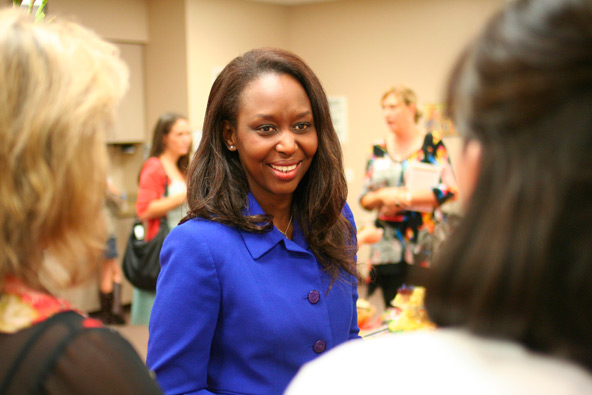
CHANDLER — Immaculee Ilibagiza, who survived the 1994 genocide in Rwanada that took the lives of nearly a million people, including nearly every member of her family — spoke Oct. 29 to a spellbound crowd of 1,200 at St. Andrew the Apostle Parish.
The evening began with a video presentation that showed attendees the three-by-five-foot bathroom where Ilibagiza hid along with seven other women for a harrowing 91 days.
“When I entered the bathroom, I weighed 115 pounds,” Ilibagiza said. “When I left, I was 65 pounds.”
The massive killing was sparked by the death of the Hutu president in a plane crash. Hutus, who did not want Tutsi tribe members to control the government, launched a killing spree by inciting angry mobs in radio addresses.
Ilibagiza, who at the time was home for the Easter holiday, remembered how her parents were well-respected members of the community. “People asked my parents what to do. The borders were closed. The markets and schools were closed. Tutsis being killed — that was the only activity,” Ilibagiza said.
The only other member of Ilibagiza’s family to survive the massacre was a brother who was out of the country. “I lost my parents, my brothers, my grandparents, my cousins, my aunts and uncles and my friends,” Ilibagiza said.
The genocide in Rwanda did not have to happen, she told the crowd. The Blessed Virgin Mary had appeared at Kibeho and warned that terrible things were going to happen if people did not pray. The messages, she said, were not aimed only at Africa.
“I hope we can listen in this country,” Ilibagiza said.
As she hid in the tiny bathroom, she was first consumed by anger. “I did not understand why it was a crime to be a Tutsi,” she said. “But the question to ask at a time like this is not ‘why,’ but ‘what can I do now?’”
She began to pray, though at first she could not bring herself to utter the words “as we forgive those who have trespassed against us” in the Our Father. “Then I realized that Our Lord gave that prayer to us and I should not edit it,” Ilibagiza said.
She began to pray for the grace to forgive. That grace was given. Ilibagiza would pray 27 rosaries and 40 Divine Mercy Chaplets a day in the bathroom.
If there’s a lesson to be drawn from her experience, Ilibagiza said, it’s forgiveness.
“If I can forgive, anyone can,” she said. “What God did for me, He can do for you. There is always hope.”
Alan Heikela said he, his wife and children read “Left to Tell” three years ago. Ilibagiza’s comments on forgiveness at the Oct. 29 event were powerful, he said.
“We’re no different than anyone else,” Heikkala said. “Just hearing someone else’s story of what she went through and that she could forgive so readily — you see the love of God radiating through her. If she can do it, we should all do it.”
Ilibagiza lauded the graces given to those who pray the rosary and the Seven Sorrows. She presented a CD of the rosary to a woman in the crowd who said she wasn’t Catholic, but was willing to give the devotion a try.
Ilibagiza said that many people have told her that by praying the Seven Sorrows, they have been healed from cancer, have overcome addictions and achieved pregnancy after years of infertility.
She was invited to Phoenix by Seton Catholic Preparatory High School and spoke at the Chandler school Oct. 30. The entire school read her book to prepare for her visit.





